
Last year during our study of Acts we summarized the meaning of many of the Feasts of the Lord. To refresh your memory, there are seven feasts God himself implemented in the book of Deuteronomy that the people of Israel were to celebrate every year. There are four feasts in the Spring and three in the Fall. All of the feasts have two distinguishing characteristics, they look back at a time God rescued the people of Israel (even before the nation existed) and look forward toward a prophecy about the Messiah. The prophecies found in the four Spring feasts were all fulfilled during Jesus’ first coming and were accomplished on the actual feast days, the last three will be realized in the same way. The first of the three Fall feasts is Rosh Hashanah, and it starts today (Sunday September 13, 2015) at sunset.
Read more: Rosh Hashanah
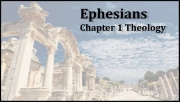
Now that we understand the teachings of chapter one overall, we may turn our attention to what Paul is teaching us about God and our salvation. I will take the lessons mostly so you may read the chapter alongside these revelations.
Read more: Ephesians Series Part 5
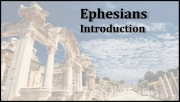
This week we start a new series on the book of Ephesians. One of Paul’s “prison epistles,” Ephesians was written alongside the letters Philippians, Colossians and Philemon about ad 60-62. The Ephesian church was built five years previous to this letter, and became the central hub of Christian missions. Ephesus was a costal metropolis which thrived under Roman rule. At it’s sea ports stood the temple of Diana, 425 feet long, 220 feet wide, to greet all travelers arriving by ship. Because it held one of the Seven Wonders of the World it was also an area heavily populated with metal workers who would form Diana replicas, charms and amulets of all kinds.
Read more: Ephesians - Introduction

Last week we mentioned that Jesus had two key concepts emphasized in the Sermon on the Mount. Last Thursday we learned the first of these was persecution; today we learn the second. The second key concept is: Rejoice when persecuted.
Read more: Sermon on the Mount, Part Four
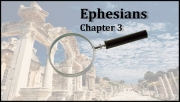
Mystery. Ancient secrets. These words conjure up intense sparks of interest and controversy. Everyone wants to be the detective who uncovers the secret and the sage who understands it. Whether we prefer Sherlock Holmes or Indianna Jones doesn’t matter, we all share a common curiosity to be the first to know the sapiential truth of life. Perhaps that’s why Paul employes the word for secret five times in this chapter alone. Do you want to know a secret that been hidden for the aeons in God? Then read on!
Read more: Ephesians Series Part 7
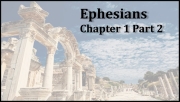
Yesterday we looked at the structure of the first 14 verses of Ephesians chapter one, and today we’ll have a look at the rest of the chapter. Next week we’ll take a closer look at the message Paul delivers and the theology that it teaches.
In verse 15 we see Paul shift from the “we\our” and “you” language to a more personal form of writing. This shift in tone, however, does not mean a shift in topic. Remember that all of chapter one is a single sentence in the Greek, so regardless of how your translation may divide these passages there is no division in the original context. Indeed, verse 15 starts out with the phrase “for this reason”, meaning all that has come before is relevant to what he about to reveal next.
Read more: Ephesians Series Part 3

A number of reader’s ask where all my information comes from, and how do I produce the materials on this site, and even how I produce the site. Today I thought I’d take some time to answer those questions.
Read more: What I Use

Yesterday we left off announcing that there are two key concepts Jesus teaches during the Sermon on the Mount. The first of these concepts is: Realize persecution WILL happen. Jesus tells us in Matthew 10.22 that “All men will hate you because of me…” And Paul tells Timothy “In fact, everyone who wants to live a godly life in Christ Jesus will be persecuted…” (2 Timothy 3.12). This truth prompts two questions: do you desire to live a godly life in Jesus? When was the last time you were persecuted?
Read more: Sermon on the Mount, Part Three
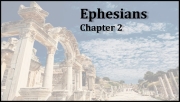
Let’s start this chapter with a reminder that this chapter dicvision is absolutely meaningless in the context of the original language. As we’ve learned, chapter one is actually one long sentence. Chapter two does not continue in that run-on manner, but does connect the same ideas. In fact, the first word of the second chapter is kai, the Greek word for “and”. Paul is continuing his thought process from the first chapter, so ignore the titles, the chapter and the verse divisions in your Bible and see this as part of the same context.
Read more: Ephesians Series Part 6
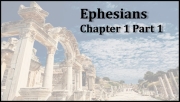
I’ve always enjoyed this particular epistle. So much so that when my college professor for an advanced Greek reading course asked me to choose a book to translate that summer, I picked this particular letter. He grinned widely and I knew I must have made a mistake. “Should I choose something else?” I asked. “No no,” he said with an innocent face. “It’s a great choice. Come back next week with Chapter one translated.” His devilish smirk had a reason. What I didn’t know, couldn’t know until I looked at it, is that all of chapter one is a single sentence. Yep, one long run-on sentence which makes translating it particularly difficult.
Read more: Ephesians Series

Is the person you show to others who you really are? How often do you break commitments? How "sound" was your last tax return?A casual perusal of Job 1.1-2.1 is enough to discover the central theme of the entire book. Notice the very first thing Satan attempts to get Job to do? Notice what it is that Satan tries to get Job to give up? So what is the story of Job really about? On all three counts the answer is identical: Integrity.
Read more: Throwback Thursday - Integrity

Jesus continues to teach using the third person until he gets to the passage we are studying in more detail today, verses 10, 11 and 12. You will notice that there is a shift in verse 11 where Jesus stops speaking in the third person and starts speaking in the second. But before we get into the meat of what Jesus is teaching in these three verses, I want to make sure we understand what Jesus is intending in all the beatitudes.
Read more: Sermon on the Mount, Part Two












